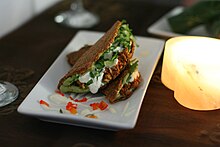Diet (nutrition)
This article needs additional citations for verification. (November 2015) |

In nutrition, diet is the sum of food consumed by a person or other organism.[1] The word diet often implies the use of specific intake of nutrition for health or weight-management reasons (with the two often being related). Although humans are omnivores, each culture and each person holds some food preferences or some food taboos. This may be due to personal tastes or ethical reasons. Individual dietary choices may be more or less healthy.
Complete nutrition requires ingestion and absorption of vitamins, minerals, essential amino acids from protein and essential fatty acids from fat-containing food, also food energy in the form of carbohydrate, protein, and fat. Dietary habits and choices play a significant role in the quality of life, health and longevity.
Health
A healthy diet may improve or maintain optimal health. In developed countries, affluence enables unconstrained caloric intake and possibly inappropriate food choices.[2]
Health agencies recommend that people maintain a normal weight by limiting consumption of energy-dense foods and sugary drinks, eating plant-based food, limiting consumption of red and processed meat, and limiting alcohol intake.[3]
The Dietary Guidelines for Americans is an evidence-based information source that policy makers and health professionals use to advise the general public about healthy nutrition.
Dietary choices

Many people choose to forgo food from animal sources to varying degrees (e.g. flexitarianism, pescetarianism, vegetarianism, veganism) for health reasons, issues surrounding morality, or to reduce their personal impact on the environment, although some of the public assumptions about which diets have lower impacts are known to be incorrect.[4] Raw foodism is another contemporary trend. People who follow these diets can get all necessary nutrients, but may need to specifically focus on consumption of nutrients like protein (nutrient), iron, calcium, zinc, and B12. [5]
Weight management
A particular diet may be chosen to promote weight loss or weight gain. Changing a subject's dietary intake, or "going on a diet", can change the energy balance and increase or decrease the amount of fat stored by the body. The terms "healthy diet" and "diet for weight management" are often related, as the two promote healthy weight management.[6][7] If a person is overweight or obese, changing to a diet and lifestyle that allows them to burn more calories than they consume may improve their overall health, possibly preventing diseases that are attributed in part to weight, including heart disease and diabetes.[8] Conversely, if a person is underweight due to illness or malnutrition, they may change their diet to promote weight gain. Intentional changes in weight, though often beneficial, can be potentially harmful to the body if they occur too rapidly. Unintentional rapid weight change can be caused by the body's reaction to some medications, or may be a sign of major medical problems including thyroid issues and cancer among other diseases.[9]
Eating disorders
An eating disorder is a mental disorder that interferes with normal food consumption. It is defined by abnormal eating habits and thoughts about food that may involve eating much more or much less than needed.[10] Common eating disorders include anorexia nervosa, bulimia nervosa, and binge-eating disorder.[11] Eating disorders affect people of every gender, age, socioeconomic status, and body size.[12]
Religious and cultural dietary choices
Some cultures and religions have restrictions concerning what foods are acceptable in their diet. For example, only Kosher foods are permitted by Judaism, and Halal foods by Islam. Although Buddhists are generally vegetarians, the practice varies and meat-eating may be permitted depending on the sects.[13] In Hinduism, vegetarianism is the ideal. Jains are strictly vegetarian and consumption of roots is not permitted.
Diet classification table
| Food type | Omnivorous | Carnivorous | Pescetarian | Semi-vegetarian | Vegetarian | Vegan | Fruitarian | Paleo | Ketogenic | Jewish | Islamic | Hindu | Jain |
|---|---|---|---|---|---|---|---|---|---|---|---|---|---|
| Alcoholic drinks | Yes | No | Yes | Yes | Yes | Yes | No | No | No | Maybe | No | Maybe | No |
| Fruit | Yes | No | Yes | Yes | Yes | Yes | Yes | Yes | No | Yes | Yes | Yes | Maybe |
| Berries | Yes | No | Yes | Yes | Yes | Yes | Yes | Yes | Maybe | Yes | Yes | Yes | Yes |
| Vegetables | Yes | No | Yes | Yes | Yes | Yes | No[a] | Yes | Yes | Yes | Yes | Yes | Yes |
| Greens | Yes | No | Yes | Yes | Yes | Yes | No | Yes | Yes | Yes | Yes | Yes | Maybe |
| Legumes | Yes | No | Yes | Yes | Yes | Yes | Maybe | No | No | Yes | Yes | Yes | Yes |
| Nuts | Yes | No | Yes | Yes | Yes | Yes | Maybe | Yes | Maybe | Yes | Yes | Yes | Maybe |
| Tubers | Yes | No | Yes | Yes | Yes | Yes | No | Maybe[b] | No | Yes | Yes | Yes | Maybe |
| Grains | Yes | No | Yes | Yes | Yes | Yes | Maybe | No | No | Yes | Yes | Yes | Yes |
| Honey | Yes | No | Yes | Yes | Yes | No | No | Yes | No | Yes | Yes | Yes | No |
| Dairy | Yes | No | Maybe[c] | Maybe | Maybe[d] | No | No | No | Maybe | Yes[e] | Yes | Yes | Yes |
| Eggs | Yes | Yes | Maybe[c] | Maybe | Maybe[f] | No | No | Yes | Yes | Yes | Yes | Maybe | No |
| Insects | Yes | Yes | No | Sometimes | No | No | No | Yes | Yes | No[g] | No[g] | Maybe | No |
| Crustaceans & mollusks | Yes | Yes | Yes | Sometimes | No | No | No | Yes | Yes | No | Maybe[h] | Maybe | No |
| Fish | Yes | Yes | Yes | Sometimes | No | No | No | Yes | Yes | Yes | Yes | Maybe | No |
| Poultry | Yes | Yes | No | Sometimes | No | No | No | Yes | Yes | Yes | Yes | Maybe | No |
| Mutton | Yes | Yes | No | Sometimes | No | No | No | Yes | Yes | Yes | Yes | Maybe | No |
| Venison | Yes | Yes | No | Sometimes | No | No | No | Yes | Yes | Yes | Yes | Maybe | No |
| Pork | Yes | Yes | No | Sometimes | No | No | No | Yes | Yes | No | No | Maybe | No |
| Beef | Yes | Yes | No | Sometimes | No | No | No | Yes | Yes | Yes | Yes | No | No |
Notes
- ^ Some plants traditionally considered to be vegetables—such as tomatoes, eggplants, capsicums, and zucchinis—are permitted.
- ^ Typically, potatoes are not permitted but cassava, yams, and sweet potatoes are.
- ^ a b Almost all permit either egg or dairy consumption, with most allowing both. Stricter rules, like seagans, also reject eggs and dairy along with their rejection of poultry and red meat.
- ^ Lacto vegetarians, ovo-lacto vegetarians, and Jain Vegetarians permit dairy.
- ^ Dairy is permitted but is not to be cooked or consumed with any meats or fish
- ^ Both ovo vegetarians and ovo-lacto vegetarians permit eggs.
- ^ a b Locusts are sometimes permitted, depending on the religious denomination.
- ^ Mollusks and crustaceans like crab are prohibited according to the Shi'a branch of Islam. The acceptability of shrimp/prawn is debated
See also
References
- ^ noun, def 1 – askoxford.com
- ^ "Told to Eat Its Vegetables, America Orders Fries" article by Kim Severson in The New York Times September 24, 2010, accessed September 25, 2010
- ^ "Policy and Action for Cancer Prevention Food, Nutrition, and Physical Activity" (PDF). World Cancer Research Fund & American Institute for Cancer Research. 2010. Archived from the original (PDF) on 2015-09-11. Retrieved 2016-04-28.
- ^ The embodied energy of food: the role of diet DA Coley, E Goodliffe, J Macdiarmid Energy Policy 26 (6), 455-460
- ^ "Vegetarian Diet". MedlinePlus. Retrieved June 26, 2020.
- ^ "Healthy Eating: How do you get started on healthy eating?". Webmd.com. 2009-10-12. Retrieved 2011-12-11.
- ^ Aphramor, Lucy (2010-07-20). "Validity of claims made in weight management research: a narrative review of dietetic articles". Nutrition Journal. 9 (1): 30. doi:10.1186/1475-2891-9-30. ISSN 1475-2891. PMC 2916886. PMID 20646282.
{{cite journal}}: CS1 maint: unflagged free DOI (link) - ^ "Diets". MedlinePlus. Retrieved June 26, 2020.
- ^ "Body Weight". MedlinePlus. Retrieved June 26, 2020.
- ^ "Eating Disorders". medlineplus.gov. Retrieved 2020-04-10.
- ^ "NIMH » Eating Disorders". www.nimh.nih.gov. Retrieved 2020-04-10.
- ^ "Eating Disorders". National Institute of Mental Health. Retrieved June 26, 2020.
- ^ Keown, Damien (26 August 2004). A Dictionary of Buddhism. Oxford University Press. p. 77. ISBN 9780191579172.
External links
 The dictionary definition of diet at Wiktionary
The dictionary definition of diet at Wiktionary
